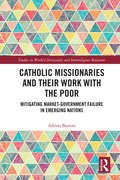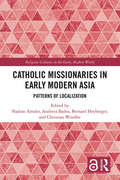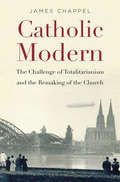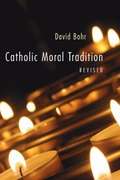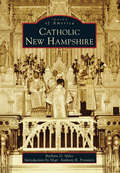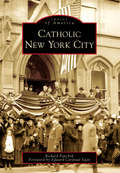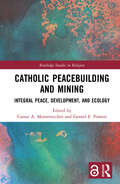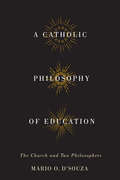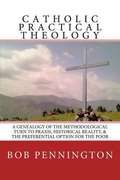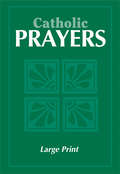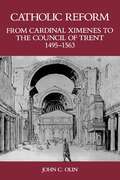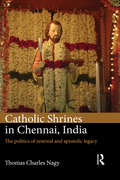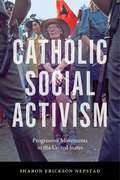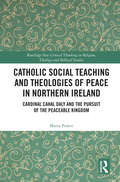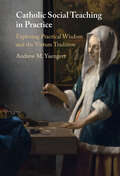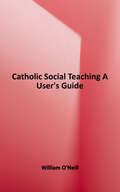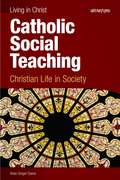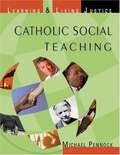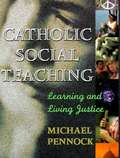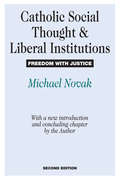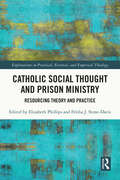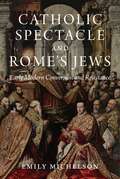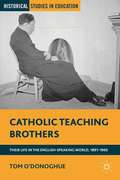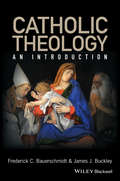- Table View
- List View
Catholic Missionaries and Their Work with the Poor: Mitigating Market-Government Failure in Emerging Nations (Studies in World Christianity and Interreligious Relations)
by Albino BarreraThis book explores the vital role of faith-based organizations (FBOs) in compensating for the market’s and government’s inability to provide vital services. Its key theoretical contribution is the notion that poverty is the result of a triadic failure—when markets, government, and civil society become dysfunctional at the same time. Using data on Catholic missionaries’ development work, this study presents the various ways by which FBOs mitigate market and government failures in healthcare, education, and social services, and in the process build and strengthen civil society. This study has two main objectives. First, it aims to present an overview of missionaries’ development work, evaluating the socioeconomic significance of their faith-based development work. In addition, various comparative advantages and disadvantages have been imputed to FBOs in the religion-development literature, and we assess to what extent missionaries actually exhibit these posited qualities in practice. Second, the groundwork is laid for future religion-development scholars by presenting a theoretical framework and a method for evaluating the role and contributions of FBOs in the larger community. This is an important investigation of contemporary worldwide Christianity and its relationship with development. As such, it will interest scholars of religious studies and missiology, as well as development economics, public service and the political economy.
Catholic Missionaries in Early Modern Asia: Patterns of Localization (Religious Cultures in the Early Modern World)
by Nadine Amsler Andreea Badea Bernard Heyberger Christian WindlerOver recent decades, historians have become increasingly interested in early modern Catholic missions in Asia as laboratories of cultural contact. This book builds on recent ground-breaking research on early modern Catholic missions, which has shown that missionaries in Asia cooperated with and accommodated the needs of local agents rather than being uncompromising promoters of post-Tridentine doctrine and devotion. Bringing together some of the most renowned and innovative researchers from Anglophone countries and continental Europe, this volume investigates how missionaries’ entanglements with local societies across Asia contributed to processes of localization within the early modern Catholic church. The focus of the volume is on missionaries’ adaptation to four ideal-typical social settings that played an eminent role in early modern Asian missions: (1) the symbolically loaded princely court; (2) the city as a space of especially dense communication; (3) the countryside, where missionary presence was only rarely permanent; (4) and the household – a central arena of conversion in early modern Asian societies. Shining a fresh light onto the history of early modern Catholic missions and the early modern Eurasian cultural exchange, this will be an important book for any scholar of religious history, history of cultural contact/global history and early modern history in Asia.
Catholic Modern: The Challenge Of Totalitarianism And The Remaking Of The Church
by James ChappelIn 1900 the Catholic Church stood staunchly against human rights, religious freedom, and the secular state—disastrous concepts unleashed by the French Revolution. Yet by the 1960s its position was reversed. How did the world’s largest religious organization become modern? James Chappel finds answers in the shattering experiences of the 1930s.
Catholic Moral Tradition
by David BohrThis book presents an introductory summary of contemporary Catholic moral teaching based upon the renewal mandated by the Second Vatican Council. It also incorporates subsequent Church documents, especially the moral encyclicals of John Paul II--'Veritatis Splendor' and 'Evangelium Vitae'--along with his three encyclicals on Catholic social doctrine and the 'Catechism of the Catholic Church'.
Catholic New Hampshire (Images of America)
by Barbara D. MilesIn 1855, Rev. David W. Bacon became the first bishop of the Diocese of Portland, which included Maine and New Hampshire. Between the two states, six priests and eight churches ministered to a few hundred Catholics. In the following years, Bacon founded 63 churches, ordained 52 priests, built 23 schools, and attended to a Catholic population of about 80,000. In 1884, New Hampshire became an independent diocese. By 1903, founding bishop Denis Bradley introduced over 30 missions; parishes; schools, including Saint Anselm College; and charitable services. Since its inception in 1884, ten bishops selected from New Hampshire and other states have honored the Diocese of Manchester with their leadership. Throughout most of the 20th century, New Hampshire experienced growth in vocations and education. Starting in the 1970s, there was a decline of parochial students, vocations, and sacramental reception. Today, over 250,000 Catholics worship in the Granite State within 89 parishes.
Catholic New York City (Images of America)
by Richard Panchyk Edward Cardinal EganCatholic New York City celebrates the religious and cultural life f one of the largest Catholic populations in the world. The first Catholic church was founded in the 1780s, and the diocese was subsequently founded in 1808, when there were only a few priests in the entire state. The 1879 completion of the country's best-known Catholic church, St. Patrick's Cathedral, was a crowning moment in New York City's Catholic history. Between 1850 and 1900, the Catholic population of New York City grew from 200,000 to more than 1.2 million due to a tremendous influx of Irish, German, Italian, Polish, and other European immigrants. Throughout the last 200 years, the city has been home to a wide range of fascinating Catholic personalities, places, and events.
Catholic Peacebuilding and Mining: Integral Peace, Development, and Ecology (Routledge Studies in Religion)
by Caesar A. MontevecchioThis book explores the role of Catholic peacebuilding in addressing the global mining industry. Mining is intimately linked to issues of conflict, human rights, sustainable development, governance, and environmental justice. As an institution of significant scope and scale with a large network of actors at all levels and substantial theoretical and ethical resources, the Catholic Church is well positioned to acknowledge the essential role of mining, while challenging unethical and harmful practices, and promoting integral peace, development, and ecology. Drawing together theology, ethics, and praxis, the volume reflects the diversity of Catholic action on mining and the importance of an integrated approach. It includes contributions by an international and interdisciplinary range of scholars and practitioners. They examine Catholic action on mining in El Salvador, Peru, Colombia, the Democratic Republic of the Congo, and the Philippines. They also address general issues of corporate social responsibility, human rights, development, ecology, and peacebuilding. The book will be of interest to scholars of theology, social ethics, and Catholic studies as well as those specializing in development, ecology, human rights, and peace studies.
Catholic Philosophy of Education: The Church and Two Philosophers
by Mario O. D'SouzaToday’s pluralist and multicultural society raises questions about how to teach religiously and ethnically diverse students in Catholic schools. A Catholic Philosophy of Education addresses these challenges by examining the documents from the Roman Congregation for Catholic Education alongside the writings of Jacques Maritain and Bernard Lonergan. Mario D’Souza proposes a contemporary formulation for a Catholic philosophy of education in which the ideals of Catholicism form the basis for the mission of the Catholic school. Drawing on the Church’s educational documents, and informed by Maritain and Lonergan, D’Souza explains how the unifying anthropology of Catholic education enables Catholic schools to serve amidst diversity by avoiding the extremes of religious exclusivism and fundamentalism, on the one hand, and relativism and individualism, on the other. He explores the aims of Catholic schools in relation to students, teachers, and society, and the relationship between goodness, discipline, and knowledge. He argues that students must be educated for personal and communal freedom and authenticity, and to strive for the common good, suggesting how a Catholic philosophy of education can provide the framework for such personal and communal transformation. Essential reading for new and experienced Catholic educators, A Catholic Philosophy of Education demonstrates that Maritain and Lonergan have much to offer in service of an education that is liberating, instructive, illuminating, and integrative.
Catholic Practical Theology: A Genealogy of the Methodological Turn to Praxis, Historical Reality, & the Preferential Option for the Poor
by Bob PenningtonWestern European Foundations, Latin American Praxis, Contemporary Practical Theology.
Catholic Prayers
by Sean M. DavidFinally, a collection of Catholic Prayers in a large print format. Perfect for those who are sight-challenged. Includes traditional prayers, the Rosary with new Luminous Mysteries, the Stations of the Cross, the Anointing of the Sick, and much more
Catholic Reform From Cardinal Ximenes to the Council of Trent, 1495-1563: An Essay with Illustrative Documents and a Brief Study of St. Ignatius Loyola
by John C. OlinAvailable in a new digital edition with reflowable text suitable for e-readersThe sixteenth century in Europe is characterized historically by the religious upheaval known as the Reformation, with attention generally focusing on Luther and the other Protestant reformers who broke from the established church. This development however, major as it was, is not the whole story of reform in the sixteenth century. Underlying and encompassing the Protestant Reformation was a broader search for religious renewal and reform that remained within the Catholic Church and is sometimes referred to was the Catholic Reformation. This volume focuses on this surprisingly neglected aspect of sixteenth-century religious reform, filling an important need in Reformation studies. John C. Olin, well known for his writings on Erasmus and the Reformation, shows how Catholic reform did not begin in opposition to Protestantism but as a parallel movement, springing out of the same context and responding to very similar needs for religious change and revival. The book opens with an introductory essay that views the course of Catholic reform from the initiatives of Cardinal Ximenes, who became archbishop of Toledo and primate of Spain in 1495, to the work of the Council of Trent in 1563 – years of crucial importance for the survival and revival of the Catholic faith. Following the essay are several key documents, including the preface to the Complutensian polyglot bible and decrees of the Council of Trent, that illustrate from contemporary sources the character of the movement of Catholic reform. There is also a brief study of St. Ignatius Loyola, as well as numerous illustrations and an extensive bibliography.
Catholic Shrines in Chennai, India: The politics of renewal and apostolic legacy
by Thomas Charles NagyThough proportionally small, India's Christians are a populous and significant minority. Focussing on various Roman Catholic churches and shrines located in Chennai, a large city in South India where activities concerning saintal revival and shrinal development have taken place in the recent past, this book investigates the phenomenon of Catholic renewal in India. The author tracks the changing local significance of St. Thomas the Apostle, who according to local legend, was martyred and buried in Chennai and details the efforts of the Church hierarchy in Chennai to bring about a revival of devotion to St. Thomas. Insodoing, the book considers Indian Catholic identity, Indian Christian indigeneity and Hindu nationalism, as well as the marketing of St. Thomas and Catholicism within South India.
Catholic Shrines in Chennai, India: The politics of renewal and apostolic legacy
by Thomas Charles NagyThough proportionally small, India's Christians are a populous and significant minority. Focussing on various Roman Catholic churches and shrines located in Chennai, a large city in South India where activities concerning saintal revival and shrinal development have taken place in the recent past, this book investigates the phenomenon of Catholic renewal in India. The author tracks the changing local significance of St. Thomas the Apostle, who according to local legend, was martyred and buried in Chennai and details the efforts of the Church hierarchy in Chennai to bring about a revival of devotion to St. Thomas. Insodoing, the book considers Indian Catholic identity, Indian Christian indigeneity and Hindu nationalism, as well as the marketing of St. Thomas and Catholicism within South India.
Catholic Social Activism: Progressive Movements in the United States
by Sharon Erickson NepstadA history of Catholic social thought Many Americans assume that the Catholic Church is inherently conservative, based on its stances on abortion, contraception, and divorce. Yet there is a longstanding tradition of progressive Catholic movements in the United States that have addressed a variety of issues from labor, war, immigration, and environmental protection, to human rights, women’s rights, exploitive development practices, and bellicose foreign policies. These Catholic social movements have helped to shift the Church from an institution that had historically supported incumbent governments and political elites to a Church that has increasingly sided with the vulnerable and oppressed. This book provides a concise history of progressively oriented Catholic Social Thought, which conveys the Catholic Church’s position on a variety of social justice concerns. Sharon Erickson Nepstad introduces key papal encyclicals and other church documents, showing how lay Catholics in the United States have put these ideas into practice through a creative and sometimes provocative political engagement. Nepstad also explores how these progressive movements have pressured the religious hierarchy to respond to pressing social issues, such as women’s ordination, conscription, and the morality of nuclear deterrence policies. Catholic Social Activism vividly depicts how these progressive movements have helped to shape the religious landscape of the United States, and how they have provoked controversy and debate among Catholics and non-Catholics alike.
Catholic Social Teaching and Theologies of Peace in Northern Ireland: Cardinal Cahal Daly and the Pursuit of the Peaceable Kingdom (Routledge New Critical Thinking in Religion, Theology and Biblical Studies)
by Maria PowerThis book investigates the response of the Catholic Church in Northern Ireland to the conflict in the region during the late Twentieth Century. It does so through the prism of the writings of Cardinal Cahal Daly (1917-2009), the only member of the hierarchy to serve as a bishop throughout the entire conflict. This book uses the prolific writings of Cardinal Daly to introduce his idea of the ‘Peaceable Kingdom’ and demonstrate how Catholic social teaching has been used to promote peace, justice and nonviolence. It also explores the public role of the Catholic Church in situations of violence and conflict, as well as the importance for national churches in developing a voice in the public square.Finally, the book offers a reflection on the role of Catholic social teaching in contemporary society and the ways in which the lessons of Northern Ireland can be utilised in a world where structural violence, as evidenced by austerity, and reactions to Brexit in the United Kingdom, is now the norm. This work challenges and changes the nature of the debate surrounding the role of the Catholic Church in the conflict in Northern Ireland. It will, therefore, be a key resource for scholars of Religious Studies, Catholic Theology, Religion and Violence, Peace Studies, and Twentieth Century History.
Catholic Social Teaching in Practice: Exploring Practical Wisdom and the Virtues Tradition
by Andrew M. YuengertAlthough the virtues are implicit in Catholic Social Teaching, they are too often overlooked. In this pioneering study, Andrew M. Yuengert draws on the neo-Aristotelian virtues tradition to bring the virtue of practical wisdom into an explicit and wide-ranging engagement with the Church's social doctrine. Practical wisdom and the virtues clarify the meaning of Christian personalism, highlight the irreplaceable role of the laity in social reform, and bring attention to the important task of lay formation in virtue. This form of wisdom also offers new insights into the Church's dialogue with economics and the social sciences, and reframes practical political disagreements between popes, bishops, and the laity in a way that challenges both laypersons and episcopal leadership. Yuengert's study respects the Church's social tradition, while showing how it might develop to be more practical. By proposing active engagement with practical wisdom, he demonstrates how Catholic Social Teaching can more effectively inform and inspire practical social reform.
Catholic Social Teaching: A User's Guide
by William O'Neill"A guide to key themes of the Catholic social teaching tradition and its implications for ethical issues such as war, peacemaking, and the global refugee crisis"-- Provided by publisher.
Catholic Social Teaching: Christian Life In Society (Living in Christ Series)
by Brian Singer-TownsThis course will guide students in exploring and understanding the social teachings of the Church. It will address the major themes of Catholic social teaching and what they express about God's plan for all people and our obligations to care for one another, especially those most in need in society. The course will work to move students to a life of service and work for the Kingdom of God. The Living in Christ Series * Makes the most of the wisdom and experience of Catholic high school teachers as they empower and guide students to participate in their own learning. * Engages students' intellect and responds to their natural desire to know God. * Encourages faith in action through carefully-crafted learning objectives, lessons, activities, active learning, and summative projects that address multiple learning styles. What you will find . . . * Each Living in Christ student book is developed in line with the U. S. Bishops' High School Curriculum Framework and provides key doctrine essential to the course in a clear and accessible way, making it relevant to the students and how they live their lives. * Each Living in Christ teacher guide carefully crafts the lessons, based on the key principles of Understanding by Design, to guide the students' understanding of key concepts. * Living in Christ offers an innovative, online learning environment featuring flexible and customizable resources to enrich and empower the teacher to respond to the diverse learning needs of the students. * The Living in Christ series is available to you in traditional full-color text and in digital textbook format, offering you options to meet your preferences and needs.
Catholic Social Teaching: Learning & Living Justice
by Michael PennockSummarizes seven key themes of Catholic social teaching as highlighted by the American bishops in Sharing Catholic Social Teaching.
Catholic Social Teaching: Learning and Living Justice
by Michael PennockCatholic Social Teaching: Learning and Living Justice supports the American bishops call for a renewed commitment to integrate and to share the riches of the Church's social teaching in Catholic education and formation at every level. It summarizes the key themes of Catholic social teaching as highlighted by the American bishops in Sharing Catholic Social Teaching. The text covers these other important principles: The Principle of the Dignity of the Human Person; The Principle of Respect for Human Life; The Principle of the Call to Family, Community, and Participation; The Principle of Rights and Responsibilities; The Principle of the Common Good; The Principle of the Preferential Option and Love for the Poor and Vulnerable; The Principle of the Dignity of Work and the Rights of Workers; The Principle of Solidarity; The Principle of Stewardship: Care for God's Creation.
Catholic Social Thought and Liberal Institutions: Freedom with Justice
by Michael NovakIncreasingly, the religious leaders of the world are addressing problems of political economy, expressing concern about the poor. But will their efforts actually help the poor? Or harm them? Much depends, Michael Novak asserts, upon what kind of institutions are constructed, that is, upon realism and practicality.His thesis may be simply stated: Although the Catholic Church during the nineteenth and early twentieth centuries set itself against liberalism as an ideology, it has slowly come to admire liberal institutions such as democracy and free markets. Between the Catholic vision of social justice and liberal institutions, Novak argues, there is a profound consonance (but not identity). Both celebrate realism, respect for institutions, and prudence or practical wisdom. The Catholic tradition adds to liberal individualism a strong communitarian sense.This book was first published in 1984 as Freedom with Justice. This new edition adds both a lengthy introduction carrying forward the original argument and a long concluding chapter on Pope John Paul IPs controversial new encyclical of early 1988, Sollicitudo Rei Socialis.
Catholic Social Thought and Prison Ministry: Resourcing Theory and Practice (Explorations in Practical, Pastoral and Empirical Theology)
by Elizabeth Phillips Stone-Davis, Férdia J.This book explores how the themes and insights of official Catholic Social Teaching (CST) and broader Catholic social thought might illuminate, and be illuminated by, a deeper engagement with the context of prisons. What resources might Catholic social thought bring to pastoral work in prisons? And what might listening to the prison context bring to Catholic social thought? The volume includes constructive proposals for the relationship between CST and prison ministry, as well as critical questions about the role and shortcomings of prisons, CST, and chaplaincy. It contains contributions by scholars and practitioners of theology, criminology, and prison chaplaincy from the UK, US, and Ireland, and reflects on the inextricable relationship of social action and pastoral care in the work of prison ministry.
Catholic Spectacle and Rome's Jews: Early Modern Conversion and Resistance
by Dr Emily MichelsonA new investigation that shows how conversionary preaching to Jews was essential to the early modern Catholic Church and the Roman religious landscapeStarting in the sixteenth century, Jews in Rome were forced, every Saturday, to attend a hostile sermon aimed at their conversion. Harshly policed, they were made to march en masse toward the sermon and sit through it, all the while scrutinized by local Christians, foreign visitors, and potential converts. In Catholic Spectacle and Rome’s Jews, Emily Michelson demonstrates how this display was vital to the development of early modern Catholicism.Drawing from a trove of overlooked manuscripts, Michelson reconstructs the dynamics of weekly forced preaching in Rome. As the Catholic Church began to embark on worldwide missions, sermons to Jews offered a unique opportunity to define and defend its new triumphalist, global outlook. They became a point of prestige in Rome. The city’s most important organizations invested in maintaining these spectacles, and foreign tourists eagerly attended them. The title of “Preacher to the Jews” could make a man’s career. The presence of Christian spectators, Roman and foreign, was integral to these sermons, and preachers played to the gallery. Conversionary sermons also provided an intellectual veneer to mask ongoing anti-Jewish aggressions. In response, Jews mounted a campaign of resistance, using any means available.Examining the history and content of sermons to Jews over two and a half centuries, Catholic Spectacle and Rome’s Jews argues that conversionary preaching to Jews played a fundamental role in forming early modern Catholic identity.
Catholic Teaching Brothers: Their Life in the English-Speaking World, 1891–1965 (Historical Studies in Education)
by Tom O’DonoghueO'Donoghue's book, which is written as a traditional historical narrative, while also utilizing a comparative approach, is concerned with the life of Catholic religious teaching brothers across the English-speaking world, especially for the period 1891 to 1965, which was the heyday of the religious orders.
Catholic Theology: An Introduction
by James Buckley Frederick Christian BauerschmidtIntroduction to Catholic Theology is an accessible but in-depth examination of the ways in which Catholic theology is rooted in and informs Catholic practice. Weaves together discussion of the Bible, historical texts, reflections by important theologians, and contemporary debates for a nuanced look at belief and practice within the Catholic faith Provides an overview of all major theological areas, including scriptural, historical, philosophical, systematic, liturgical, and moral theology Appropriate for students at all levels, assuming no prior knowledge yet providing enough insight and substance to interest those more familiar with the topic Written in a dynamic, engaging style by two professors with more than 50 years of classroom experience between them
